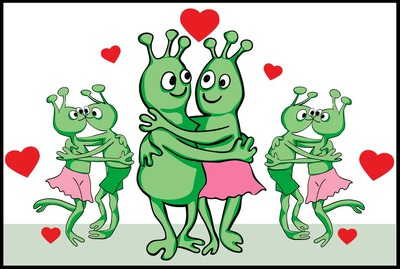Let Me Call You … Stóirín (Storeen) (Irish Terms of Endearment) Posted by róislín on Feb 7, 2014 in Irish Language

“Lig Dom ‘Stóirín’ a Thabhairt Ort!” “Ó, cinnte, agus ‘Croí’ agus ‘Cuisle’ agus ‘Cumann’ agus ‘Grá’ agus …”
(le Róislín)
Irish has many many terms of endearment. It actually also has many pejorative terms for people, ach sin ábhar blag eile. In this blog, given the season, we’ll look at various ways to say “darling,” “sweetheart,” and “love” in Irish. Some of these have been covered in previous blogs around this time of year, but they’re always worth another gander.
First let’s look at some of the ones which also have other very basic meanings in Irish aside from the realm of love and affection. We’ll see the basic word in Irish and its meaning as a term of endearment. There will be a blank space to fill in the related meaning (freagraí thíos):
1) croí [kree], dear, etc.; “A chroí!” [uh khree] (_______________)
2) cuisle [KWISH-luh], beloved, etc.; “A chuisle!” [uh KHWISH-luh] (________________)
3) cumann, darling, sweetheart, etc.; “A chumann!” (__________________)
4) rún, dear, etc.; “A rún!” (_______________)
5) stór, darling, etc. ; “A stór!” (_________________). This one is sometimes made diminutive by adding an ending, “stóirín,” which may be seen anglicized as “storeen.” “A stór” may show up as “asthore” in English texts.
6) taisce [TASH-kyuh], dear, etc.; “A thaisce!” [uh HASH-kyuh] (________________)
And then there are some terms of endearment that are primarily just that, terms of endearment or other words relating to love:
7) ansa, love, loved one, “A ansa!” (This is a variation of “ansacht” and, incidentally, is a chance homonym of “ansa,” an adjective meaning “difficult,” and of “ansa,” an astronomy term, the same as the English “ansa,” the most projecting part of planetary rings, such as those of Saturn, based on the Latin “ansa,” a “handle” — nothing to do with “love handles,” but it’s a tempting thought!)
8) grá, love; “A ghrá!”
9) muirnín, darling, sweetheart, etc. ; “A mhuirnín!”
10) searc, love; “A shearc!”
And then, according to Tadhg Mac Dhonnagáin’s delightful “Is Tú Mo Chiaróg,” there are more phrases that can be co-opted for this purpose, but I wouldn’t vouch for them in real life. He sings:
Is tú mo bheinnsín luachra,
Is tú mo staicín eorna
Is tú mo mhála fataí
I lár an Ghorta Mhóir
Is tú m’fhóidín móna
Is tú m’fhóidín mearaí
Nach dtuigeann tú gur tú mo smugairle róin.
In sequence, he is comparing his sweetheart to a sheaf of rushes (beinnsín luachra), a stack of barley (staicín eorna), a sack of potatoes in the middle of the Great Hunger (mála fataí i lár an Ghorta Mhóir), a sod of turf (fóidín móna), a “sod of confusion” [sic] (fóidín mearaí), and a jellyfish (smugairle róin). The latter, even more endearingly, translates literally to “seal snot,” based on “rón” (seal).
Nasc don amhrán: http://www.futafata.ie/ (listed under “dlúthdhioscaí”)
With all of that, I wonder how Zsa Zsa Gabor would have taken to speaking Irish. Could she have “dahlink-ized” the word “storeen” in some way? Ah, well, ábhar machnaimh. Fad m’eolais níor cuireadh Gaeilge ar “Green Acres” riamh. but come to think of it, I wonder if whoever dreamed up the character of Arnold the Talking Pig might have been influenced by the “muca” in Caibidil 3 of Myles na gCopaleen’s An Béal Bocht — the ones that the author tells us fooled an inspector into believing that the household had twelve English-speaking piglets.
Well, whether you use terms of endearment primarily around Lá Vailintín or all year around, the above selection should offer a pleasant range of choices. And remember they’re often doubled up, adding to the sentiment (A ghrá mo chroí! A chuisle mo chroí!, srl.). SGF, Róislín
Freagraí: 1) croí, heart; 2) cuisle, vein, pulse; 3) cumann, company, community, fellowship, love, society, association (as in Cumann Lúthchleas Gael, The Gaelic Athletic Association); 4) rún, mystery, secret; 5) stór, stock, provision, storage place; 6) taisce, treasure, hoard, storehouse
Pictiúr: http://webclipart.about.com/od/Valentine_Day/ss/Valentine-Clip-Art-2014_2.htm

Build vocabulary, practice pronunciation, and more with Transparent Language Online. Available anytime, anywhere, on any device.




Comments:
maighread:
Blag iontach.
róislín:
@maighread Tá áthas orm gur thaitin sé leat, a Mhaighréad. GRMA as scríobh isteach.
CalLadyQED:
What about “acushla” or “achusla” as in “O Molly, my Irish Molly,/my sweet achusla dear”? I know it’s more an Irish-American song. Is that term significantly anglicized?
róislín:
@CalLadyQED GRMA as scríobh isteach, a CalLadyQED,
You’re right, “acushla” is a term of endearment, as in the song you mention, My Irish Molly. A variant was used in the movie _Million Dollar Baby_ with Hilary Swank, but if memory serves, the “litriú” was “mícheart.” It comes from the Irish word “cuisle” (pulse), put into the vocative (direct address) form. It becomes “a chuisle” [uh KHISH-luh]. “A chuisle” can be used on its own or in the phrase “a chuisle mo chroí.”
Cian Molloy:
Mo phlúr thú, a Róislín, tá do bhlag thar a bheith maith!
róislín:
@Cian Molloy Go raibh míle maith agat, a Chéin. Tá sé an-deas sin a chluinstin. Agus sin frása deas eile: mo phlúr thú (a fhad is go dtuigeann ach’an duine gur “flower” atá i gceist agus ní “flour.” : )
Dála an scéil, an tusa an Cian a scríobh “The Story of the Irish Pub” (Liffey Press)? Sárobair! Bhí sé suimiúil a fhoghlaim cad é a d’ith (d’ól!) an Bhanríon Eilís I don bhricfeasta. Ná bac leis an “Whiskey _Before_ Breakfast” (mar a deir an fonn traidisiúnta). Beoir mar bhricfeasta, an ea? Tá súil agam go raibh rud éigin mar thósta aici leis!
Veronica Daly:
@róislín Which would translate to my little treasure
“Mo stor beag” or “a stoirin”
Or are they pretty much the same?
Thanks in advance!!